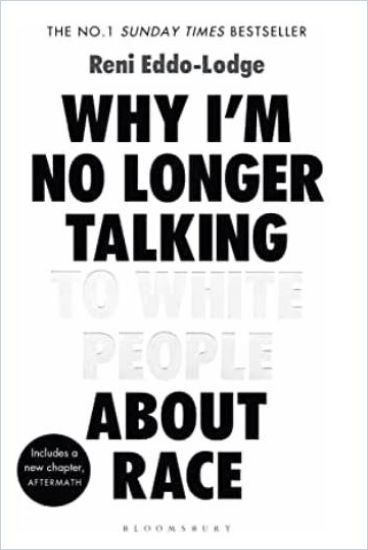In 2014, British journalist Reni Eddo-Lodge stopped having conversations with white people about race: They weren’t listening. For those who are listening now, her book offers an essential education on Black history in Britain, structural racism, and what white people can – and should – do about it.

A Primer on British Racism
White people, on the whole, resist the topic of racism – and seeing their own complicity in it. Black observers were pointing to the phenomenon long before Robin DiAngelo coined the term “white fragility.” For Reni Eddo-Lodge, white people’s habit of shutting down, interrupting and denying during conversations about race led her, in 2014, to stop having them. In a viral blog post, she asked what purpose there could be in talking with people who weren’t listening.
The Risks of Talking About Race
Eddo-Lodge points out that, for Black people, any discussion of racism with white people can turn perilous. Black people who talk with white people about race risk reprisals – professional or personal – and the possibility of being labeled as angry, a troublemaker or a bully.
We tell ourselves that racism is about moral values, when instead it is about the survival strategy of systemic power.Reni Eddo-Lodge
Talking about race, for people of color, can put job opportunities, work relationships and housing at risk. It can lead to social exclusion and threats of physical harm. Black people, therefore, don’t enter conversations about race with white people on an equal footing – and the vast majority of Caucasians don’t understand this. The risks and costs of these conversations partly accounted for Eddo-Lodge’s decisions to stop having them.
Britain’s First Black-Authored Bestseller
Paradoxically, Eddo-Lodge’s decision resulted in her talking with white people about race more than ever. Eddo-Lodge – a British journalist and feminist – found herself speaking to crowds at live events and to children in schools, appearing on television and commenting on social media. The book Why I’m No Longer Talking to White People About Race followed in 2017, borrowing its title from the original blog post. The book is made up of seven essays, at once sharp and impassioned, that together offer necessary background for conversations about race in Britain – coupled with eloquent arguments for having them.
In order to dismantle unjust, racist structures, we must see race.Reni Eddo-Lodge
The book garnered enthusiastic reviews in publications as varied as The Financial Times and Stylist; it appeared on book-of-the-year lists at the Guardian, Times Literary Supplement, Forbes and the Observer; Marlon James – author of A Brief History of Seven Killings – called it essential. But it took the heightened attention to racism that followed George Floyd’s death in Minneapolis in 2020 to drive Eddo-Lodge’s book to the top of the UK bestseller list: Eddo-Lodge became the first Black British author to hold that spot. The book has become a mainstay on antiracism reading lists.
Racism in Britain
Why I’m No Longer Talking to White People About Race earns its accolades by delivering two items previously neglected in the public conversation on race in Britain. First, the book offers context for these discussions: frank, thoughtful and well-researched outlines of British race history, the civil rights movement in Britain and the shape of structural racism there; white privilege – and white fears; feminism’s difficulty embracing antiracism; and the intersection of race and class in Britain. The author concisely traces the presence of Black people in Britain from the beginning of slavery in 1562 and follows the struggle for civil rights from its genesis in 1931. She argues against the concept of color blindness, elucidates the effects on Black people of the structural racism that pervades Britain’s institutions, and illustrates the ways white privilege burdens people of color and stymies change.
White privilege is an absence of the negative consequences of racism.Reni Eddo-Lodge
Accessible and often absorbing, these discussions represent Eddo-Lodge’s attempt to remedy the failure of British society to educate Brits, Black and white, about the history of race relations and the mechanics by which Blacks remain oppressed. Eddo-Lodge often laments her own former ignorance, and the reader has the impression of following her down a path of self-education. That journey led her to such scenes as Liverpool’s slave port and a new housing development in northeast London that illustrates the intermingling of race and class. It also led the author to interviews with characters such as Paul Stephenson, an activist who helped launch the Bristol bus boycott; Jessica, a young British woman of mixed race; and right-wing BNP leader Nick Griffin for insight into the fears and resentments of some Brits.
Compelling, often unsettling, the essays succeed in revealing the framework and history that add up to a stifling, heartbreaking status quo. Their primary defect lies in the abundance of facts in combination with the vehemence of Eddo-Lodge’s conclusions – a pairing that at times leaves to the reader the task of assembling their connections. The chapter on race and class, in particular, demands careful attention on the reader’s part. Disappointingly, this relatively benign failing left the book vulnerable to misinterpretation and misrepresentation in less-than-friendly reviews.
White People Must Act
Second, Why I’m No Longer Talking to White People About Race delivers a searing call to action on the part of white people. Although the book addresses people of color as well as white people, its ultimate message exhorts white readers to recognize and accept that the task of ending racism falls on the shoulders of white people. Eddo-Lodge urges them to assist activist groups, intervene as bystanders when necessary and advocate for antiracism among whites.
White people, you need to talk to other white people about race.Reni Eddo-Lodge
Black writers have long issued angry admonishments to white readers: Sustain your ignorance and complicity at your own peril. For white readers who still have not heard, Reni Eddo-Lodge could not have stated the imperative more succinctly or clearly: “Racism is a white problem.”






